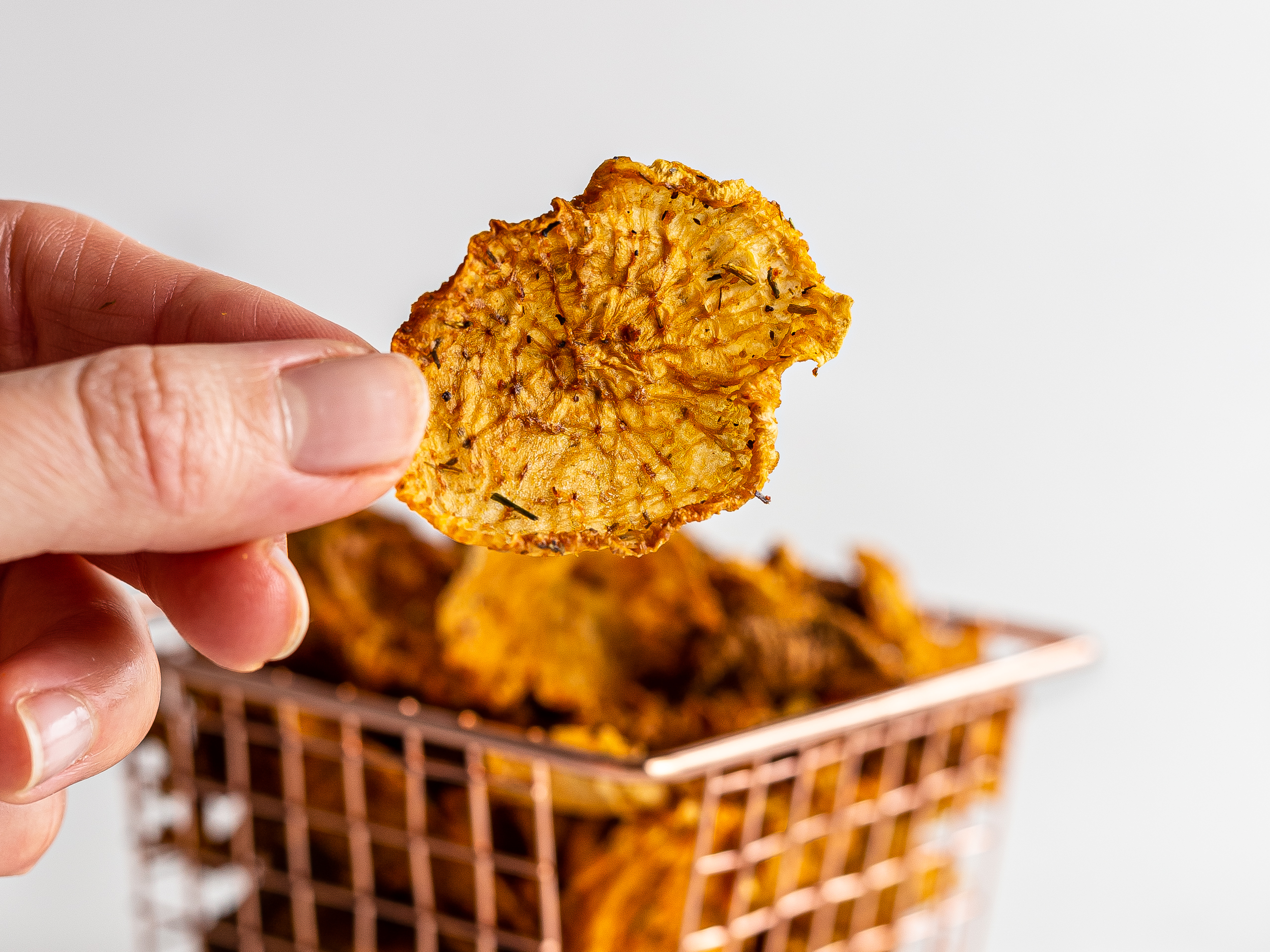Crave some crispy chips but don't want all those fats and calories? Then check out our baked daikon chips, with zero fats and 1/3rd of the calories of classic fried potato chips.
Making daikon chips is super simple. All you need is daikon, some spices, and an oven! We used thyme, garlic powder and paprika. It's a delicious mix that pairs wonderfully with the subtle flavour of daikon. Feel free to use any other spice mix you fancy!
Did you know that 100 grams of daikon have only 18 calories? That's mostly because this root has a water content close to 95%. For this reason, frying daikon is not going to work. You are going to burn it before it becomes crispy. Instead, we are going to dehydrate it by slow-baking it in the oven.
Baking the daikon chips instead of frying them is great because we'll get rid of most of the added calories you get from potato chips. In fact, by comparing the calories of plain potatoes with those of a bag of potato chips, you infer that frying oil accounts for roughly 82% of the calories. Say no to that!
Instead, This is what you'll get from a serving of homemade daikon chips (25 grams):
Zero grams of fats
5 grams of fibres
5 grams of net carbs
50 calories
Basically, these chips are a dream for weight-loss: they have very few calories, no fats at all, and a serving gives you 25% RDI of fibres. Moreover, the low number of net carbs makes them suitable for the keto diet. And, of course, these daikon chips are vegan and gluten-free.
Ready for some crunch? Let's get started!
NOTE: The default ingredients yield 50g (1.7 oz) of oven-baked daikon chips and one serving is 25g (0.8 oz) of chips.
Is daikon low carb?
Weight by weight, daikon radish is lower in carbs than white potatoes. A 100 grams (3.5 oz) serving of daikon has only 17 calories and 3.4 grams of carbohydrates. This means almost five times fewer calories and carbs compared to potatoes.
Moreover, among the 3.4 grams of carbs found in daikon, there are 1.6 grams of indigestible fibres, meaning the net carb count is 1.8 grams. The net carbs are those that are actually absorbed and thus affect the overall calorie count.
The ketogenic diet allows between 10% and 20% of the daily calories from carbs, meaning 40g of carbs in a 2000 calorie diet[1]. As a 25g (0.8 oz) serving of daikon chips provides 5.4 grams of net carbs, it's safe to say you can enjoy this tasty snack as part of a ketogenic regime.
How do you make vegetable chips crispy?
Homemade veggie chips are an excellent way to add more vegetables to your diet and reduce the consumption of high-fat, heavily processed foods.
Here we have listed a few essential tricks you should know to bake super crispy veggie chips from scratch:
Slice the chips thinly and evenly. Use a mandoline slicer or sharp knife to cut ultra-thin chips, about 2-3 mm thick. Also, make sure the chip's thickness is even throughout, or you'll end up with a burnt side and a soggy side.
Rinse the starch. If you're using starchy vegetables like squash or potatoes, make sure to wash away excess starch. You can do so by dipping the chips in a bowl of cold water and then draining them well.
Pat dry. As excess moisture can make your veggie chips soggy, we recommend patting them dry with kitchen paper or a tea towel.
Slow bake. If you cook the veggies chips at high temperature, they will burn before they get the chance to crisp up. Therefore, it's crucial to bake them at very low temperature, about 120°C (250°F) for 2 to 3 hours.
Cool evenly. Once the chips are ready, you must immediately transfer them onto a wire rack to allow even airflow. Otherwise, they will get soggy from the moisture trapped underneath. As soon as they're cold, store them away in an airtight glass or tin container to lock in the crunchiness.
Do daikon radishes need to be peeled?
Keeping the daikon skin on or not depends on the type of recipe you're making. If you're using daikon in a soup or any liquid-based dish, we recommend peeling the skin as it won't taste good when boiled.
If you're making a roast tray or oven-baked chips instead, you should keep the skin on. As the peel is rich in fibres, it will yield crispier results and double up your fibre intake too.
In our baked daikon chips recipe, we kept the skin on, and we got amazingly crispy results.
Are veggie chips healthier than potato chips?
What makes one type of chips healthier compared to another are the cooking method and the ingredients used.
Store-bought chips, either potato or veggie-based, fried or baked, are still relatively high in fats and salt. Being heavily processed, they rely on fats and salt to increase palatability and shelf-life.
Homemade oven-baked chips, instead, are the healthiest types of chips.
This is because you can prepare them from scratch and have complete control over the amount of salt and fats used.
Baking the chips instead of deep-frying them will allow you to reduce the fats drastically. But you can even make them fat-free, as we did in our daikon chips recipe. If you season them with plenty of spices, little or no salt, you'll get super tasty chips with no need for extra oil.
Prepared this way, both veggie and potato chips make a healthy snack that you enjoy without guilt. Veggie-based chips like kale or radish crisps are an even healthier option if you're on a strict diet or ketogenic regime, as they have fewer carbs and calories. A 25g serving of our daikon chips, for example, has only 50 calories and 5 grams of sugars, yet packs 20% of your RDI for fibres.
Ingredients
| Daikon | 600 g |
| Paprika | 1 tsp |
| Garlic Powder | 1 tsp |
| Dried Thyme | 1 tsp |
| Salt | to taste |
Step 1
Rinse well the daikon, trim then ends, and keep the skin on.
Thinly slice it into chips with the help of a mandoline slicer or a sharp knife (1).
Ensure the chips are no more than 3 mm thick, or they won't crisp up as well (2).
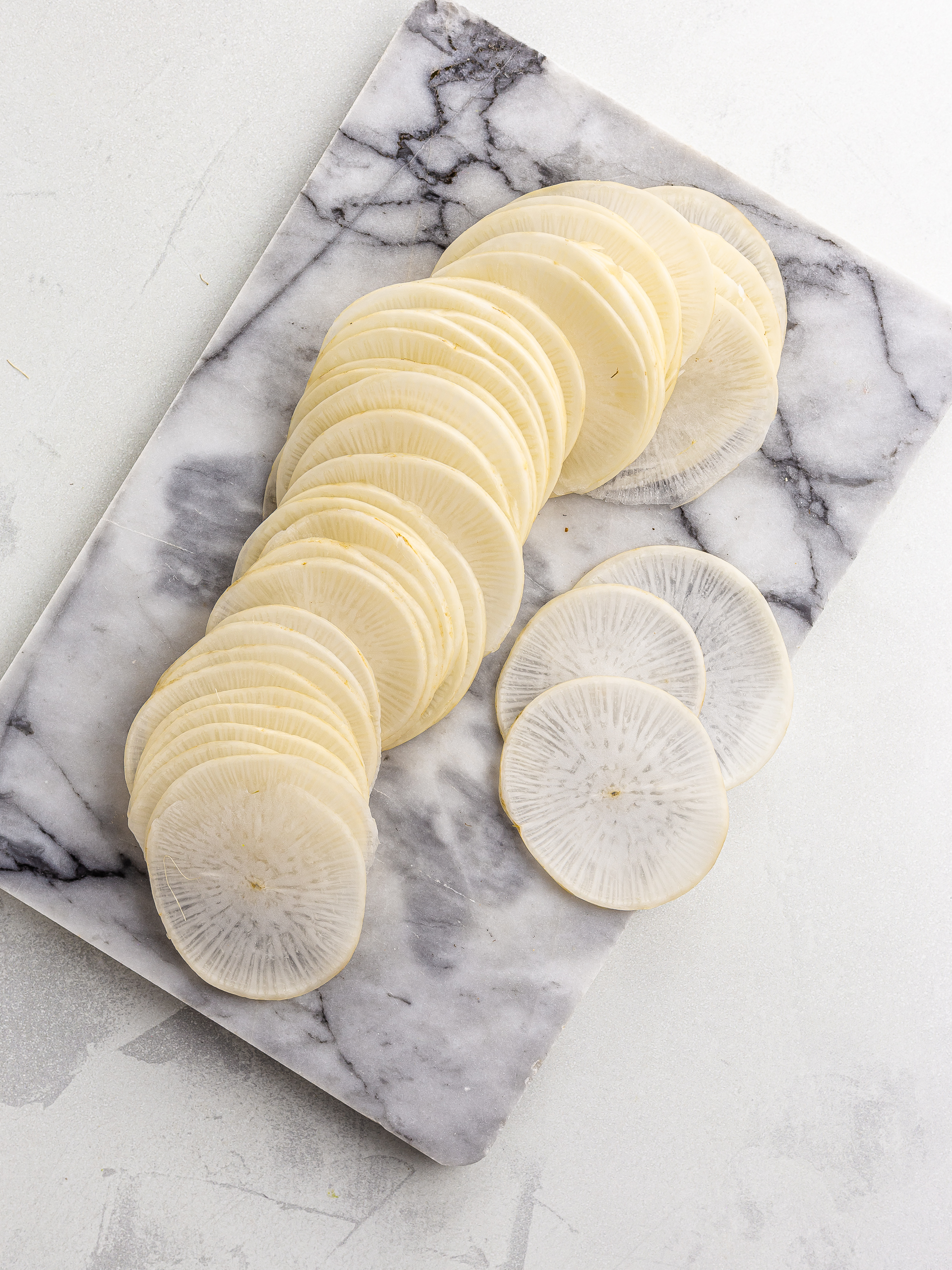
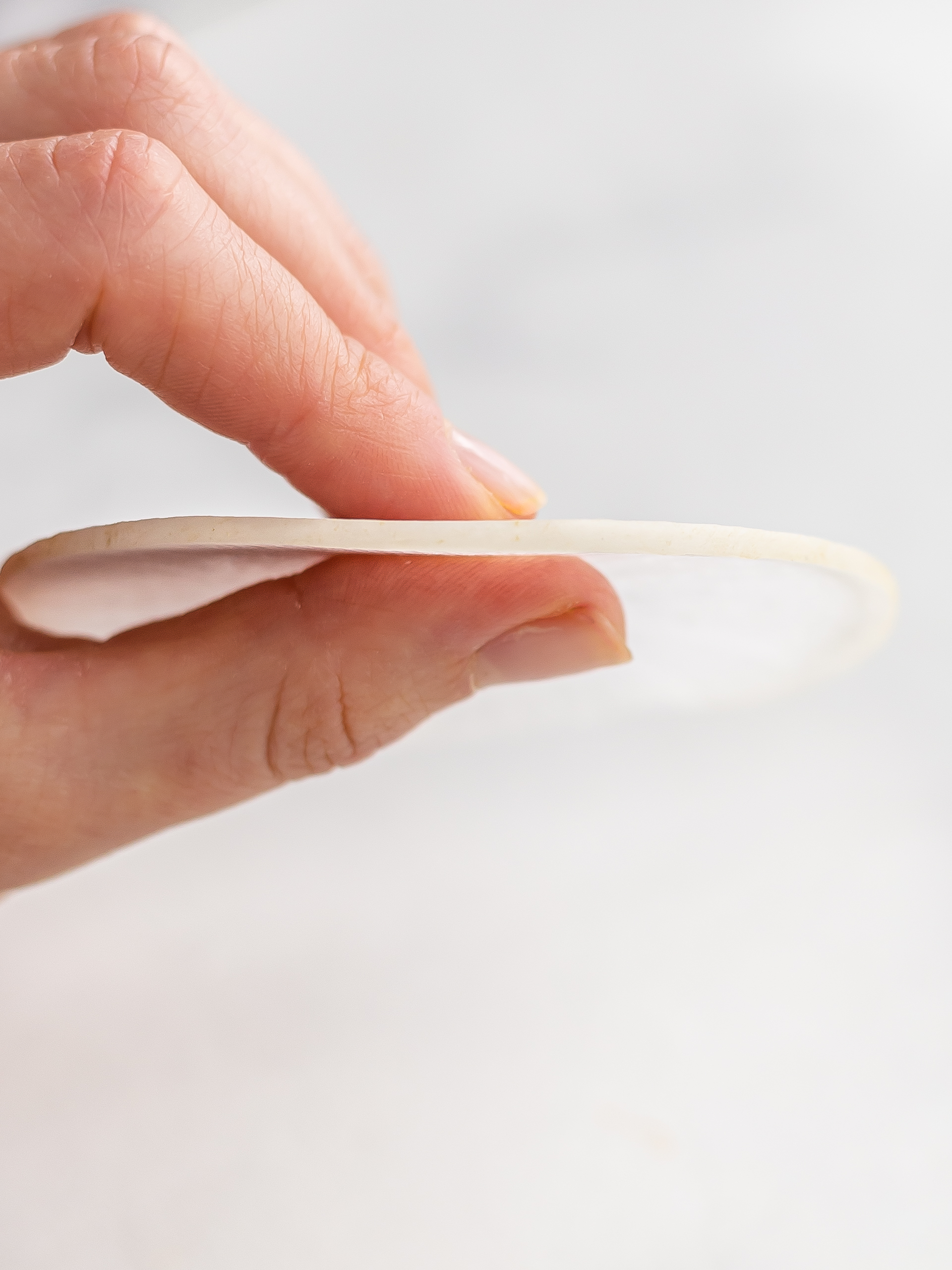
Step 2
Now, pat the chips dry with kitchen paper to remove excess moisture.
Then, toss them in a bowl with paprika, garlic powder, dried thyme, and salt.
Rub them in between your fingers to make sure they're evenly coated with the seasoning.
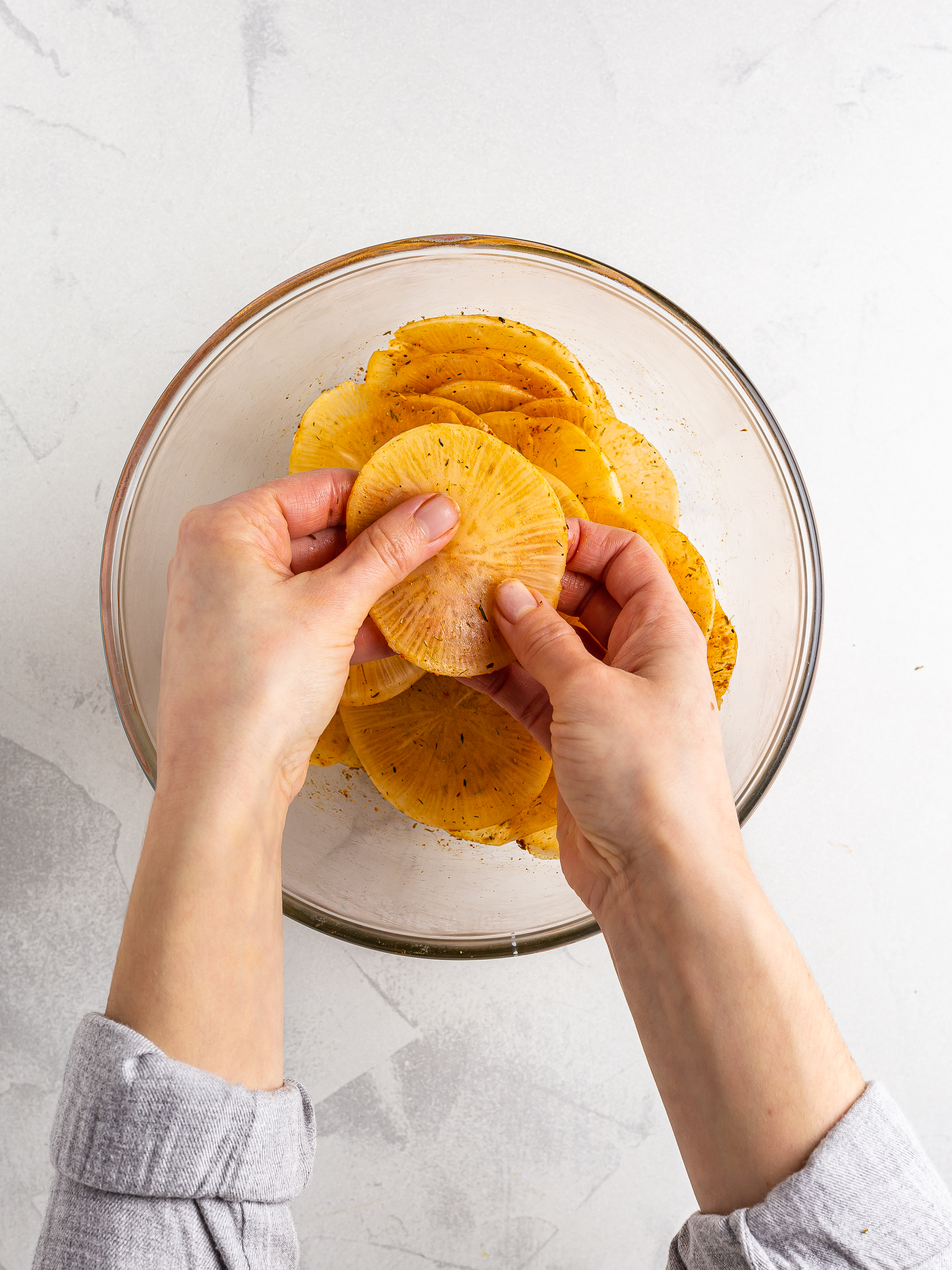
Step 3
Next, arrange the daikon chips flat on a baking tray lined with parchment paper. Keep them close to one another as they will shrink a lot when baked.
If they don't fit all in a single tray, you'll have to bake them in batches or on two trays at once.
If you go with the second option, keep in mind it will take a bit longer. Also, you'll have to switch the top of the tray with the bottom one halfway through baking to get an even browning.
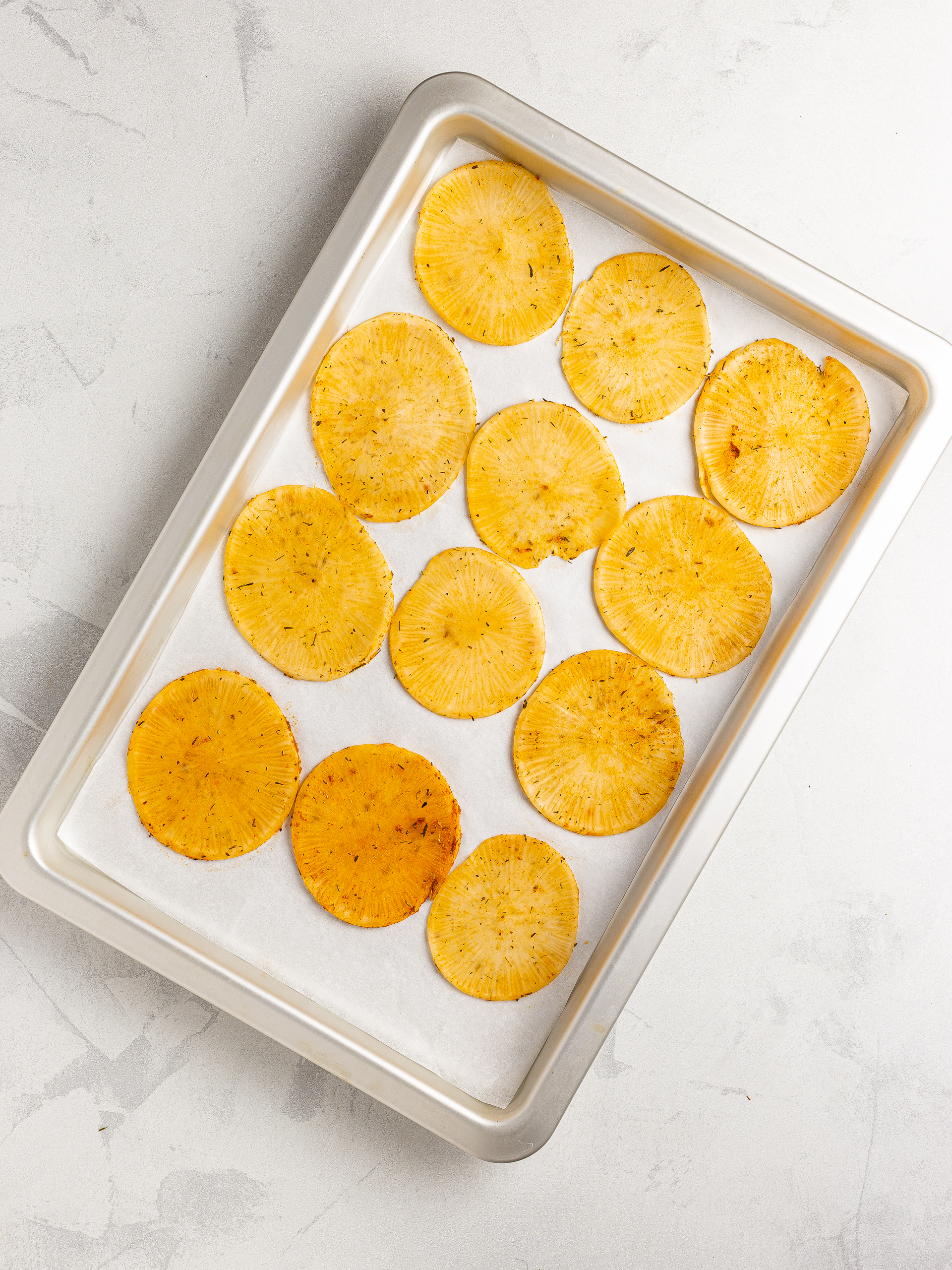
Step 4
Slow bake the daikon chips for 2 hours at 120°C (250°F) for static ovens or at 100°C (210°F) for fan ovens.
Smaller chips will cook and brown faster than the bigger ones. Therefore, we recommend checking the chips regularly after the first hour of cooking time and removing those already crispy.
When the chips feel hard to the touch, remove them from the tray and transfer them onto a wire rack. As they cool down, they will harden and crisp up even more.
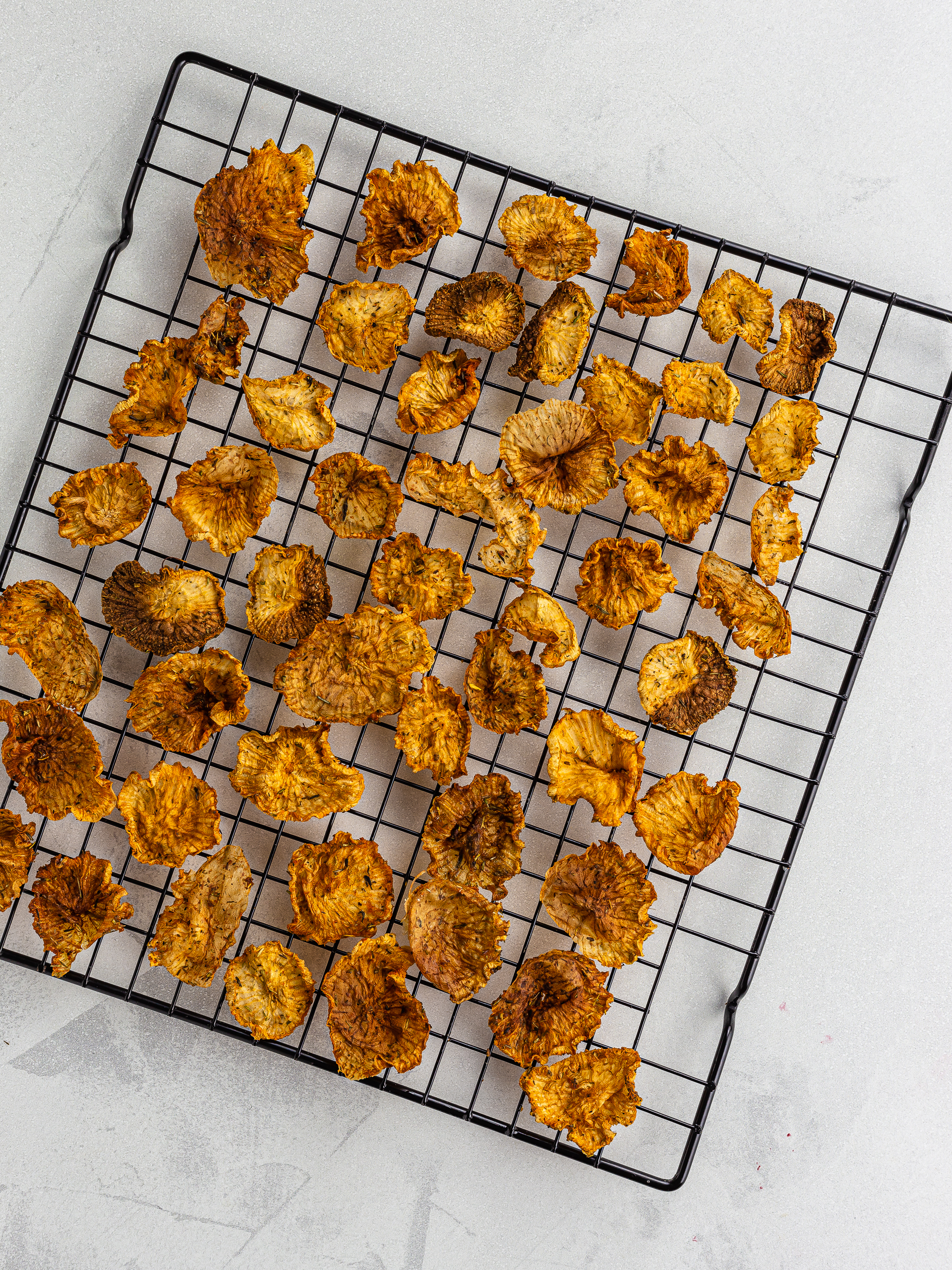
Tips
You can swap thyme with finely ground, dried rosemary.
